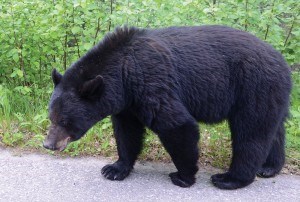
A 42-year-old Quebec man was fined $1,000, July 23, after pleading guilty to feeding a black bear in Jasper National Park.
On May 25, Eric Jasmin pulled over to the side of the road and proceeded to throw three slices of white bread out the window to a bear. The animal then consumed the food before approaching a nearby vehicle.
The exchange was witnessed by another driver, who had also pulled over to view bear.
The witness reported the incident and took photographs of Jasmin passing food out the passenger side window; those photos were presented as evidence in Jasper Provincial Court.
It is illegal to feed wildlife in a national park, as it habituates animals, causing public safety risks, as well as risks to the animals themselves. The offense is punishable with a fine of up to $25,000.
In Jasmin's defense, Laurie Rodger—who was acting as duty counsel July 23—explained that coming from Quebec, Jasmin was unaware of the law.
The Crown prosecutor recommended a $1,500 fine, citing previous rulings in Jasper and Banff national parks, where $1,000 fines were handed down for similar offenses.
In his ruling, Judge D.C. Norheim noted that there is signage along the park's highways clearly stating that it is “unlawful” to feed wildlife.
As Norheim was making his decision, July 23, Parks Canada was advising the public about the dangers of feeding wildlife.
That afternoon, the agency released a video of a June 2014 incident that shows a person feeding a black bear on Highway 93 by throwing food out the window of their SUV.
The video, like the photos in Jasmin's case, was shot by a bystander.
According to Ben Alderman, JNP's park warden supervisor, cellphones photos and videos captured by witnesses have been a great help to Parks in recent years, as it's often difficult for Parks to catch people in the act of feeding wildlife.
“In this age of social media and everyone carrying recording devices, we've seen a great opportunity for people to collect evidence for us. I can't say enough about the fact that people have that opportunity often in their pocket. A few seconds of video, a couple of photographs, even some notes jotted down or a license plate can really help us follow up on these issues and do our job,” he said.
The reason Parks is so strict about feeding wildlife is because it has a huge impact on the way animals collect food.
Alderman explained that mammals are always looking for the easiest source of food—the sustenance that requires the least energy output. So, when a person throws food out the window, the animal then associates people and cars with easily accessible food.
“When they come across a single readily available human produced food without a lot of physical effort, it only needs to happen a single time and they'll continue to come back, almost without exception,” he said. “When they do that, especially in the case of predators, they can become a bit of a hazard because they're prepared to take as much, but as little, action as required to get food from whoever they think has it.”
Alderman said although he doesn't think people start their day with the intention of feeding wildlife, in the excitement of the moment, it does happen.
“They're out looking for the opportunity to view wildlife; they're spending a lot money these days visiting a national park like Jasper, so when they see something—bighorn sheep, grizzly bear, black bear, wolf, elk deer—they sometimes use food to entice it to stay where it is or come closer.”
The biggest consequence is to the animal, said Alderman, acknowledging that there is the possibility of up to a $25,000 fine if a person is convicted in court.
The difference, he said, is that a habituated animal faces the risk of death. If it becomes accustomed to easily accessible food along the highway, it is more likely of being hit by a car. But is also more likely to be killed by Parks staff, who are given the task of terminating animals that pose a risk to public safety.
In the interest of keeping the park safe for both people and animals, Parks asks that the public report any incidents where people are feeding wildlife. That can be done by contacting the 24 hour dispatch line at 877-852-3100.
Nicole Veerman
[email protected]
